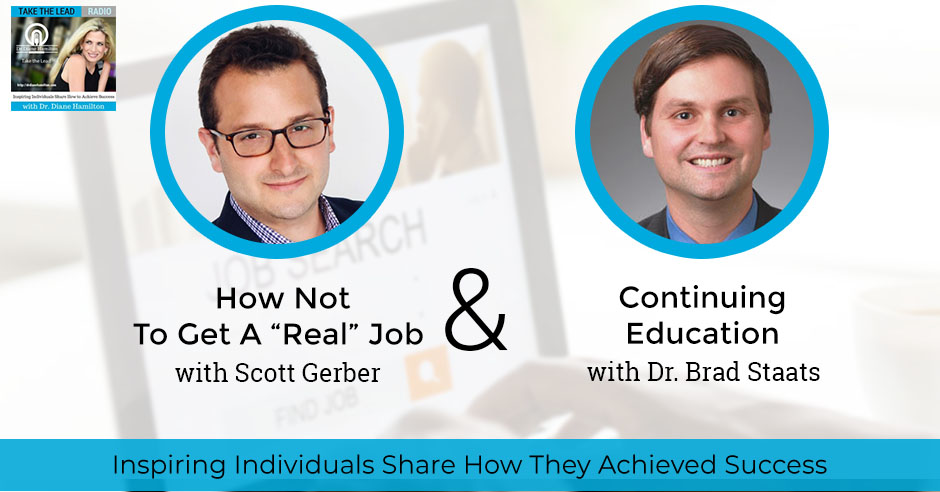
We have Scott Gerber and Brad Staats here. Scott is the CEO of The Community Company and the author of Superconnector. Brad is a UNC professor and the author of Never Stop Learning. Both of these books are interesting and they’re going to be important to all levels of business. This is going to be an important show.
Listen to the podcast here
How Not To Get A “Real” Job with Scott Gerber
I am here with Scott Gerber who is the CEO of The Community Company, an organization that builds and manages communities for global brands and media companies. He is the founder of YEC, an invitation-only organization comprised of the world’s most successful young entrepreneurs. He’s also the author of Never Get a “Real” Job and coauthor of Superconnector. It’s so nice to have you here, Scott.
Thanks for having me.
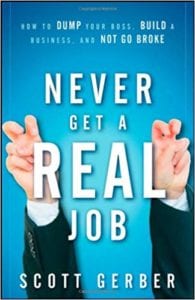
Never Get a “Real” Job: How to Dump Your Boss, Build a Business and Not Go Broke
This is going to be very fun because you’re interested in a lot of the same things I’m interested in. I love the title of Never Get a “Real” Job. What’s a real job?
It’s a job that you know is a dead end. It’s something that you don’t hold the baskets nor the eggs in it. It’s the idea of giving your time to something that ultimately could be better spent, regardless of financial compensation with something of your own creation that you have more control over.
How can we never get a real job? Can you give us some tips?
We get now in these tips and tricks environments because of clickbait headlines and the guru speak on the social sphere. The reality is that business in and of itself is difficult, but not complex. If you can sell something of value to someone and make money on top of it, you are in business. We have gotten to an age, especially with young people, where it’s going to revolutionize the world and has changed the way we know business because we read about Uber. The reality is the majority of businesses around the world are service-based businesses that you can do with your own two hands or with a basic computer and a lot of chutzpah. The first and foremost thing you say as you set your goals is, “What can you do with your own two hands?” It doesn’t necessarily mean a trade per se, but what could you do if you had no money, no resources and you had to start from scratch? Which is where a lot of people have to start from.
You don’t need big investment dollars. If you have a massive idea, maybe that’s the one to go down the line, but you have to work to get there. Learn the lessons of a service business or something that’s much more manageable at the start. When I talk to young people about business, especially those that are in college or shortly after college, the first thing they all think is you have to go raise money for this idea. I’m like, “First off, no one’s going to give you money for an idea. What can you do to prove that you, as a leader and entrepreneur, can say what you do, do what you say, and execute with passion and with results?” That’s where we have to change the conversation around, “You don’t have to reinvent the wheel or you’re going to be doing to be run over. You don’t have to fake it until you make it. You don’t have to keep up with the Joneses,” or any of these other sayings.
You need to find something very simple, keep it simple, and expand on it in slow increments as you grow. That is the best way to get into the entrepreneurial water. If you look at flat wages now in the job market. Let’s say the average American that is coming up in the ranks either first on the young side and then the average American family, I read somewhere that the average American family income is somewhere around $40,000 or $55,000 a year if you look at the entire macro map of the United States. If you are working 23 hours a day, could you get to a point in your mind where you think you can match or come close to that dollar amounts versus having to do work for someone else and losing your time? That does not allow you the freedom to be able to even try that. That’s my whole expertise on it.
My first business was a sizzle reel company. We would produce three to five minutes of promotional videos and basic ideas. I learned how to edit, so I would edit the things at night and I would be the producer salesmen during the day until I was able to scale that business. Eventually, its clients included some of the largest agencies in the world because we honed in and focused on one thing. We grew that and expanded it because we were known for that one thing. It exploded because the one thing became something everyone needed. The key is looking at all these different variables. It’s about setting your sights to realize that you don’t need to make millions, you just need to get in the game. You need to have small goals, incremental success, and quick changes to your hypothesis to get that right streamlining. Start with what you can do yourself, don’t rely on others, and build your network over time to help you expand upon your very simple, straightforward concept.
Many might have chutzpah and not a lot of moolah but you talked about you just have to prove results. How do you do that?
I’ll give you a perfect example. I am a huge believer in Junior Achievement if you’re familiar with that program. They have five million kids across the United States and around the world. They help them to learn financial readiness, entrepreneurship, and so forth. Up until about two years ago, I would watch all the students and I would always come down hard on the kids who were doing the business plan competition. When it came to the financial model, this is all an exercise, but it’s the point of they’re thinking that I’m worried about, they would all say, “We’re going to start with males in the United States between the ages of 18 and 45.” I’m sitting there like, “I don’t think these kids understand. That’s not a market, that’s an age range in a continent.”
[bctt tweet=”Business in and of itself is difficult but not complex.” username=””]In the last few years, a lot of the teachers have gotten this because I pounded it in for so long. We get things like, “We’re going to release this on the upper west side of New York for people ages 18 to 22. Here are the three tactics we’re going to do. We want to sell to this many people. We believe based on geo-targeting and fencing that this is the identifiable population. Our goal is to attract 5% of the population over the next six months.” That is how you create your own level of goal that you can achieve. The problem is most people set their goals to be insane and unrealistic, but they think they’re realistic.
You have to be bitten by that once or twice in your life where you realize, “It started as an example and it’s here in the world, but it started in one market.” People want to take over the world, but they don’t realize that it takes time, traction, and effort to build that ground game. The same thing goes back to the sizzle reel company, we didn’t try to say we do a three to five-minute promotional videos and wedding, we have one product. Then we said, “Who is the highest concentration that could use that product?” I could have said, “Brands, agencies, PR firms, and all these things.” I started with New York Boutique PR firms. They’re more accessible, the chances of getting meetings were higher, they definitely needed the service, and I had a few ends from the start from my college days. Those were how I sorted it and over time, I build a referral strategy to build on top of the networks of my customers. It takes time, it takes some ground game, and most importantly, it’s not overnight. Mindsets, money, execution, and benefit, anything you put in the plan is guaranteed to be five to ten times longer and you have to be able to be okay to handle that financially, emotionally, and intelligently.
I meet so many people who throw out the net everywhere and they get nowhere.
You burden all your resources too. If you’re trying to cast that big of a net, if you have $500 to do a marketing plan or even a social media spend, that $500 can go in a day if you don’t cast correctly. You want to make sure that you can think about how spread can you do what you do, not only on the marketing side but on the execution side. A landscaping company, if they want to get started, it’s a low-cost business, but if you have one customer that’s on one side of the state and another one that’s on another side of the state, it’s very different than if they’re on the same block or two blocks away. These are the kinds of things to think about as you build your framework for your business.
You’re an expert in how to become connected and build business relationships. It’s interesting to talk about your Superconnector book. You said something about the worst question ever. I want to know what that question is and why it’s so bad?
Before I give you the big reveal of what the question is, I’ll give you the mindset of why that question is so bad. We become an age of networkers, people that had been trained to do the LinkedIn connect, the handshake at the conference, the collect-as-many-business-card mentality, either realistically or mentally. That’s how they think, they just collect and collect. Instead, we bastardized one reliable source of value, not just for business but for humanity. It’s the idea to meet like-minded people, connecting with them, and help one another out for mutual value, to think long-term and not necessarily about some win or short-term cash. This is going to the point of why question I’m about to say is so stupid.
We’ve turned what was probably once a tried and true human-to-human way of building strong relationships into another marketing platform that marketers had destroyed. Everything that comes from that foundation, anything that was from that lens on the networker is by definition bastardizing legal parlance. It would be like a fruit from a poison tree. In giving the question, when someone comes up to a conference and talks to you for three minutes, it’s almost social scripting that at the end they say, “How can I help you?” You say to yourself, “I just met you. Who are you? What? How can you help me?”
Let’s dissect why it’s a terrible question. Number one, you’ve met the person for three minutes. In three minutes, if you had been in an engaging conversation it should tell you a lot. If you’re asking the right questions, having the right conversation, and if both parties are very interested in that conversation, you should have some general idea of where to go, where you could play a role, be valuable, or whether to speak up about that value now or try behind the scenes to create value and bring it up later.
Instead, you choose the lazy path of, “How can I help you?” because of one of two things. Either you’re not curious,
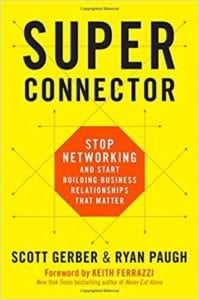
Superconnector: Stop Networking and Start Building Business Relationships that Matter
you’re not thinking, you’re not listening, or you’re simply trying to get to what you ultimately want. This is what I’ve seen most people do when they ask this question, is wait for the reciprocal, “How can I help you?” from the other person. You are basically waiting to ask for a favor and that three minutes you spent was to give the time needed to get to the point where you’re able to make an ask. The problem is laziness. It’s a clear topic, it’s not the way it was meant to be. It’s not a human relationship you’re building, you’re building a lead generation factory in your head and you’re already onto the next person right after.
The short answer is there’s a better way. It doesn’t mean that you can’t ask people for help. In the book, Ryan and I talk a lot about the ways to make a proper ask, but that’s built on a foundation of trust that you build with your network so they know who you are, what you’re about. That you’re a genuinely good person. You’re not just looking to enter their Rolodex and win. You’re trying to find something of value for everybody to win. That’s where we talked a lot about asking better questions, being generally curious, how to be a good connector versus simply being connected. The ways you can go about taking back that bastardization and bringing it to a way it was supposed to be, which is about building a strong inner circle that helps you grow as a person and in business.
You brought up the wording, “You’re not curious,” which is great because I wrote my book called Cracking the Curiosity Code because I’m into being curious and understanding why people aren’t more curious. How can we get people to learn to be more curious? Did you address that in the book?
For a lot of people, curiosity is very natural. For example, when we were talking about the book and thinking about different stories that would make sense to explain how myself or Ryan or the people that we profiled are at a level that we wanted to be. Determining how do we make the case for this particular framework or mindset understanding? One of the things I remembered is that I was big into the mock trial when I was in high school. Even far back then, I like reading the mock trial. Mock trial is a competition where schools get a make-believe legal case and you have to dissect it. The teams go head to head as lawyers and as witnesses. Two teams spar off in a competition NCAA style with a real judge. The victor is ticked, points are scored, and so forth.
[bctt tweet=”Start with what you can do yourself. Don’t rely on others.” username=””]You’re given this case and you’re not a legal mind, but the whole point is that you’re using critical thinking in order to be able to determine your best face as a non-practicing lawyer. When I realized that, I realized that I was lucky that curiosity was natural to me. It wasn’t until about a couple of years before we wrote the book that I realized for most people, it is not innate. When you’re taking in the world around you, sometimes something that is so natural to you that you don’t realize that that’s not the way it is for everybody else. Having to explore that, we looked at a number of different studies and surveys and found that asking more questions and forcing yourself to ask questions was a good way to be a jumpstart. Instead of just saying something and commenting, you could come up with a question you’d like to learn about.
Most people, if they are prompting themselves, the question is, “Are they listening? Are they able to take the critical thinking skills to take that data and make it peaceful?” That’s a whole different skill set. The first thing is asking better questions in general leads to natural curiosity. Instantly, most people get taken aback by a subject matter they don’t understand. In their minds, they’re scared to ask a follow-up because they don’t want to look stupid. It’s a topic they’re not interested in or not part of their day to day, so the other side of their network or brain will say, “I should probably get out of this conversation. This is not for me.” They stop themselves from going the extra mile.
There was a story many years ago where they had someone continue the conversation for another 30 seconds with a used car dealer that they thought had no value. They would have found out that this used car salesman’s father was the top seed investor in the entire state. When this guy was looking for serious capital, this guy probably would have made an intro but didn’t go the extra mile. I had the fortune to witnesses knowing what both sides want and what they’re talking about, and I never told either. We don’t go the extra mile to get to the point where we could build a relationship to ask. We tap out too early and we don’t care about extending. That’s the problem.
In my research, I created an assessment to determine the things that keep people from being curious. There were four things and you were hitting on them going down the road. Fear was a big one. You build assumptions when you’re saying, “It’s not for me.” People assume things based on their past, the technology, and the environment. Maybe your family or teachers encouraged you. A lot of people aren’t encouraged. To become a superconnector, I think curiosity is a huge thing. You have a Superconductor class, what does that entail?
It’s a program that we do for different conferences and speaking events. It’s like a signup class. It’s teaching people that are truly considered superconnectors. They would never refer to themselves as such because they would think that that is being gimmicky or marketing. If you put superconnector as your bio, then you probably aren’t. That’s the way these guys think. We had the fortune of talking to dozens of the smartest people from various industries, those that were both in the traditional career path and hardcore entrepreneurs. We determined a certain series of very specific systems that these folks use not to replace their humanity but to amplify it. That is the key difference.
You can do different things technologically without being someone that is network-y. You can build upon your best self by creating better scheduling mechanisms, knowing when to say no because most people always say yes, and being clear about the value you can deliver so that others know how to help you. You don’t make a million asks, you only have one. The most important thing is scheduling time, productivity. They are all productivity Ninjas. We have some folks that are probably the centers of their ecosystems, whether it be in the mobile space, lender, or general tech and they get an inbound all the time. They first say no more than yes, not to be rude, but time is their most precious asset. If they’re going to provide time for someone, they want to make sure that time is spent, not only receive value but to even be able to bestow value. It still takes time.
We have one person who through the course of the month will look through all the people he knows, email them, and see who is most interesting to him. For the folks he doesn’t know, instead of taking one-on-one meetings, he’ll put one coffee for ten people and say, “I’m going to be at this coffee place at this time. You’re welcome to come. There will be nine others.” This is very smart for a couple of reasons. Number one is common sense. He’s now built up a micro-community, so these folks will see the value that they’re are being added to a new network that perhaps they will get value from one another with this gentleman being the center of the sphere, but not necessarily the one that has to now be in the middle of the actual engagement.
[bctt tweet=”Asking better questions leads to natural curiosity.” username=””]Number two, he gets to listen to every conversation happening across the table. He’s done one round of vetting just to see who’s at the table. In the second round of vetting, in different conversations, he can go and self-select who he wants to potentially build a long-term relationship with outside of this room. Not all ten are going to have another bite of the apple in this particular case. Lastly, he has the underground factor of all these people because it’s unique, different, and a bit of an experience rather than the old coffee meeting. They talk about what this gentleman did. He has a great word of mouth campaign that he has to do nothing for. It’s a series of these kinds of mind changeovers. It’s not a tactic what he’s doing, he’s maximizing his efficiency and making sure he can maximize mutual value for everyone. That’s the mindset that a lot of these connectors have.
They also take those same things to how they make their own asks or get referrals. We have a gentleman named Derek Kober, who at the time of the writing, was one of the top wealth management companies in the United States’ independent firms. The reason that he is seen in such a high light is that most service business or wealth management firms mainly get referrals in the single digit, 5% or 7%, somewhere in that range. He was hitting high double digits annually, which is very rare because most people are not trying to tell everybody and your mother about their financial strategy. It’s a very different relationship than just, “John, meet Sam.”
He thought what could he build that basically would allow people to know who he is but also make it natural, not feel like he’s going on a network and want to provide value to the general community of people he cared about. He happened to be a huge connoisseur of very high-end wine. He created an event where you would get bottles of very rare, very expensive wines. He would go to his customers and would say, “This is a customer appreciation event. Each of you is allowed to attend and you are all allowed to bring one person. The only rule is that the person you bring must have an appreciation of wine.”

Continuing Education: You can build upon your best self by creating better scheduling mechanisms, knowing when to say no, and being clear about the value you can deliver.
What did he do right there? He got his core audience of influencers around him to rally around a concept he created. He created a vetting and criteria-based invitation. He didn’t say, “You must invite another rich person,” but he created a series of criteria that it could be their wife or spouse, it could be a general person of a connoisseur, but there’s going to be a percentage of people that are probably exactly like the customer. He’s going to go to this event and he’s not going to have to speak once about what he does. Why? That has been done by his influencer. What is this event? What’s it about? Who does it? “He’s a financial advisor. He does these amazing events, which are very exclusive. It’s something that I would love for you to attend.”
What is he doing there? He’s created the ability to get rid of all the small talk, get immediate accreditation from a peer to another peer, gives his loyal customers something cool to talk about so they can almost brag to their friends, “They get this and you don’t.” By the time the event takes place, it’s amazing. Everybody’s having a great time and the first time that Derek is going to shake hands with the plus one, the ability for him to over time build that relationship, the amount of friction removed is exponentially larger. It’s all because he created a very smart way to curate the right kinds of people. These are the kinds of systems that the Superconnector class built.
I know you have much more that you can help people with as far as how to make an ask of other people the right way, and how to run an event like a Superconductor. I can see why you’ve been featured in all the top journals, New York Times and The Wall Street Journal. I’m curious about being honored by Nasdaq and the White House. Can you tell me what that’s about?
Several years ago, we had built YEC, an entrepreneur council, which is our largest youth entrepreneurship organization in the country. We’re helping young people to learn about entrepreneurship as a viable career path and not just some renegade choice. We built this national movement and it got a lot of attention. This was around the recession or right at the tail of the recession when we were in the positive light in a crappy job market for young people. The various different parties, Nasdaq, White House, and every major press out all took notice on us trying to do something positive for our community. We were invited to do all these different things with those groups.
One of the coolest things, to this day, that I’ve ever done is I rang the bells at the close at one of the markets. What I still love and joke is that I have friends who have built multibillion-dollar companies and still hasn’t rung the bell yet. When I’ll see them, just to give them a little nudge, “Did you ring the bell yet? It’s a lot of fun, you should do that,” but it’s all in good fun. It was a true honor to be recognized, not because I’m looking for personal accolades and pats on the back. It’s a great credit to our team, what we’re passionate about, what we care about, and what we’ll be able to do to help society at large with that goal and mission.
[bctt tweet=”The environment around us is incredibly important in driving all sorts of “good behaviors”.” username=””]It’s a true honor to have you on the show, Scott. This has been great. I wonder if you wouldn’t mind sharing how people could reach you and find out more.
I’m active on Twitter so you can follow me at @ScottGerber. You can also go to Community.co to check out what we do and how we build all of our communities. If you want to learn more about me and the various things I do, you can go up to ScottDGerber.com and that will give you all the things about what I’ve done in my life. Thank you so much for your time.
You’re welcome, Scott.
Continuing Education with Dr. Brad Staats
I am here with Dr. Brad Staats, who’s the author of Never Stop Learning. He examines how individuals and organizations learn and improve to stay relevant, innovate, and succeed on an ongoing basis. He’s a Harvard graduate. He leads the Business of Healthcare Initiative at UNC where they are one of the leading national voices in education, research, and thought leadership in the business of healthcare. It’s so nice to have you here, Brad.
Thanks, Diane. I appreciate it.
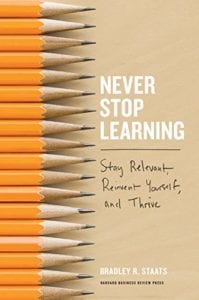
Never Stop Learning: Stay Relevant, Reinvent Yourself, and Thrive
You’re welcome. This is going to be interesting. I worked in pharmaceuticals for fifteen years and I’m interested in the business of healthcare. Is your main focus just healthcare or do you go into other areas of business as well?
From research and working with organization standpoint, probably two-thirds of my time is spent in healthcare with about a third elsewhere, and that’s gradually been creeping up. I work across a lot of different sectors, technology services being the single biggest other one, whether it’s consulting, legal retail, even tomato harvesting. There are definitely some diversity of topics there.
In the company where I worked in the healthcare, I was also in their agricultural chemical division. We have a little overlap in what we do. I’m a fan of continuing education and I saw that Daniel Pink wrote a nice blurb about your book. I’m curious of what led to your interest in the importance of writing about continuing education in Never Stop Learning?
It’s something that has always been on my mind. I had worked in the industry for a number of years, I’ve been in investment banking. I got my MBA in Strategic planning and Venture Capital. During that time, I saw individuals and organizations that I thought had very similar resources but dramatically different performances. As I tried to make sense of it, I recognized there was something to do with learning. The curiosity bug bit me enough to go back to Harvard where I’d done my MBA to pursue my doctorate to understand or try to at least learn. I spent the last almost fifteen years trying to peel the onion back of, “What is it we need to do? Why don’t we do it even when some of these things are talked about a whole lot?” More importantly, how can we redesign systems and processes to increase the chances that we do learn?
I’m writing a book right now on curiosity and that’s one of the things that drew me to your work. It’s so important right now with the discussion of we need to be more innovative. We’ve got artificial intelligence and we’ve got these things that are making the workplace a little bit different. If you’re not asking questions, being more curious and learning more, a lot of people are going to get left behind when these jobs are replaced. How do we get people to be more curious?
We all have differences across everyone. There are elements of us that are traits, that are who we have been since we were little kids. Increasingly we’re understanding that the state, the environment around us is incredibly important in driving all “good behaviors” where curiosity is a great example of one. Somebody can start more or less curious but as they start to be around questions and areas they care about, where they see a purpose and get lit up inside, then that can spark subsequent questions when they see other people being curious. It’s not this is an environment like in organizations where you keep your head down. If you speak up, you get swatted down. That creative question, even when you don’t have the answer, is instead rewarded and praised. Then we can build that in all of us. That’s some of my excitement is, in general, you can teach an old dog new tricks, it’s just that old dog has to want to learn those new tricks.
[bctt tweet=”You can teach an old dog new tricks. It’s just that the dog has to want to learn those new tricks.” username=””]I created the Curiosity Code Index, which determines the factors that hold people back. You mentioned fear, our assumptions, technology, and environment where I did a factor analysis and all the fun statistics to figure out all that stuff. You brought up environment and environment is huge. If you have a family, friends, teachers, and people that who encouraged you when you’re young, it was great, but if you didn’t, it wasn’t so great. People do fear getting shut down as you put it and we want to reward that. Are you seeing many organizations doing that?
Yes and no. Anecdotally, am I seeing more than I’d say I did a decade or even two decades ago? Yes. The good news is that people are talking about all of this a lot more. You made this point of how we need continuous learning that we’re living in this world where the only constant is change. The good news is at least at a high level that recognition exists. Awareness is certainly the first step. At the same time, it’s interesting to take something that’s related to where we are. Failure as an example and how organizations approach that.
While most organizations are at least willing to give it lip service these days that, “We need to fail fast or we need to take a ready-fire-aim approach,” I still see in general people struggling with it. They cognitively are aware, but they haven’t taken that next step of changing the system to make it okay to try something, be thoughtful about it, have good reasons for it, then if it doesn’t work out, that that’s not punished. Even that will start to shift because we’re recognizing that, “You’re not going to learn, you’re not going to innovate, you’re not going to be creative unless it’s okay for things to go wrong.”

Continuing Education: You’re not going to learn, innovate, and be creative unless it’s okay for things to go wrong.
A lot of that is not just fear and environment, but the technology for people. They get freaked out by it or are they just on it to figure everything out for them?
What technologies do you see as some of the more inhibiting ones?
If you want to know the answer to a math problem, you don’t have to figure it out anymore. If you want to know why something is something, you Google things and/or ask. They pretty much give you answers without telling you why. There’s no foundation anymore on a lot of things and you take things for granted without questioning it. I’ve taught more than a thousand business courses so I am sure you and I can talk about how much we see them rely on Wikipedia or the copy and pasting of quotes instead of paraphrasing. There’s so much that people cut and paste their learning instead of digging down deep and paraphrasing it is my analogy.
It’s great when we can jump right to the answer because it helps us move along a little bit quicker, but that doesn’t mean that we understand it. That’s what takes that next step to the creativity, learning, and innovation.
Assumptions are big because we sometimes think we’re not going to be interested in something because maybe when we were a kid, we weren’t interested in it or our family wasn’t interested in it. I know history was always my most dreaded topic, but as I get older and I’m traveling, I’m like, “This is interesting.” Things change as you get older and it is important to revisit some ideas that maybe you put off on the shelf thinking, “I’m never going to want to read about sports,” or whatever it is that you put off. How do you determine what you should keep learning?
[bctt tweet=”We take things for granted without questioning.” username=””]You’re highlighting something important of appreciating the things won’t necessarily come easily. Just because it doesn’t come easily doesn’t mean that it’s not worth it. In a related context, there’s been some research coming out recently around people looking for their passion and purpose in what they’re doing. What that work has shown very clearly is that we can either assume that we have a fixed view of it, “There’s a passion out there. I’m going to find it. There’s one of these. It can develop over time as I look and explore.” That viewpoint fundamentally changes our behavior when we accept that it may change. “I may not know exactly what it is I need to do to learn it that I’m more likely to engage with it. I’m more likely to keep going and improve. I see that there’s going to be a difficulty. There are all sorts of good things that come out of that.”
The first step is having an awareness that who we are now isn’t necessarily where we need to be later and where we’re going to be eventually. In terms of finding, one of the things we’ve certainly seen in our research is the incredible value of involving others in the process. Sometimes we struggle to see where our strengths as an example and those areas where we have a major impact. Strengths are so powerful because they’re motivating. It’s a chance for us to differentiate ourselves and to create real value.
We’ve taken advantage of an exercise out of the University of Michigan that’s called the Reflected Best Self-exercise. I have done a fair bit of work with that. The basic tool is you reach out to ten to fifteen people who know you and you have them write a few stories about when they’ve seen you at your best. You take these stories and you basically go through them to start a construct a narrative of when you’ve been at your best. What’s interesting about this process is it can be quite emotional. There’s an element of the things you knew that you’ve always interacted with folks, but there’s a lot more to it than that.
Sometimes what sticks with others isn’t necessarily what you would have thought. What’s so great about going to others is as they reflect back when you’ve been at your best, you start to get this more complete picture. For some of us, “I want to go learn whatever.” You pick your favorite topic. “Great, go do it.” For a lot of the rest, it could be here, it could be there. Think about who you know and how you can involve in that process.
Themes are important to look for it in any research. I don’t know if you did qualitative or quantitative research. I did quantitative, but I’ve been a Doctoral chair where I’ve had students present their qualitative research. It’s interesting to look for themes. It’s very challenging sometimes because you show certain sides of your personality to some people and not to others. The more people you can get to do this, you’re going to have better data to look at.
I’ve taught courses where we’ve done the Strengthsfinder, different personality assessments for people to look at different parts of what they’re good at, and every business course has a SWOT analysis. I’ve had a lot of students do a personal SWOT and those kinds of things can help as well. I want to get more businesses to focus their HR departments, CEOs, and consulting to do DISC and different personality assessments to look at the importance of continued learning and developing curiosity. Do you see that a lot of HR departments are focusing on that?
HR departments increasingly are wanting to come up with ways to measure things. That’s great. This is the rise of people analytics and that has gotten a lot of attention and continues to do so. My own work is more on the empirical side. Even in things like the Reflected Best Self, looking at randomly assigned groups who got it, who didn’t, and how measurable things change. One of the challenges, as you’re pointing at this learning and curiosity, is we’re still in the construction of metrics around those. We have a number of other tools that have been around for a long time that have very little validity, but they have wide acceptance. It’s easier as an HR department to go, “Everybody else is using this tool, if you go look at the scientific data, there’s not much value in it, but people enjoy it and it seems directionally useful.” It’s the classic, “Nobody gets fired for buying IBM.”

Continuing Education: If you’re not learning on a continual basis, then you’re going to be solving yesterday’s problems too late rather than solving tomorrow’s problems.
We’re starting to see this. These thoughtful organizations are looking at their own data and trying to think about, “How can we capture what’s going on here to know whether it’s the curiosity index, learning velocity, and what might this look like?” I don’t think we’re there. I see a handful of organizations with some very promising leads. Egon Zehnder, the recruiting firm, has done some cool work around potential. They’re trying to capture that, measure it and see some nice returns from that, but we’ve got ways to go until it’s broad-based,
[bctt tweet=”Once you know where you are, then you can go somewhere.” username=””]I was looking for what was out there to measure curiosity and there was a lot of, “Whether you’re curious or not,” type of thing. I was looking for what’s holding you back what and how do you go from there. Once you know where you are, then you can go somewhere. That’s a challenge because a lot of people just don’t even think about it. They don’t realize the importance of learning and developing unless you point out like, “This is something that maybe is not working.” I was thinking about your Never Stop Learning and you have five dimensions of the learning economy. I want to know about that. What are you addressing with that?
That’s trying to capture the need for learning. Why does the world look different now than before? None of those trends are things that just started in 2018, but it’s fair to say they all are accelerating. They’re looking at things like routinization. The fact that we can create processes means that whether it’s in a computer or not, we can use technology to do a lot of stuff that before it took a human right. You can think about things like agriculture. What’s the number of people we need to feed the world now compared to 100 years ago? In manufacturing, there’s been a lot of job loss in the US. Some of that is going to other countries, but a lot of it is just productivity increases.
The great thing about routinization is it frees us up to do other things, but we have to learn to do those other things. There are things like specialization. In medicine, it’s estimated you need 29 hours a day to stay current on what’s going on in modern medicine. That’s the problem, we have 24 and we probably like to sleep, so that means that physicians get more and more specialized so they have to learn that detail. They also have to learn to figure out how to work with others. They only know a piece of the puzzle and we need to construct you all of it to help somebody with their health.
[bctt tweet=”You can teach an old dog new tricks. It’s just that the dog has to want to learn those new tricks.” username=””]Other things like globalization, digitization, the fact that we’re creating all of this data, and eventually the integration to tie it all together. We’re no longer just in the knowledge economy. We’re very much in a learning economy that if you’re not learning on a continual basis, then you’re going to be solving yesterday’s problems too late rather than solving tomorrow’s problems that are going to create value for you and your organization.
It’s more proactive learning. How can we set that up for people at work, so they know what the next thing is they should be learning?
Some of it is around enabling conditions for folks to be curious and to be willing to learn so that they can see it themselves. Sometimes the outsider can help. I’m an expert in an area so I can come in and share. I do a lot of work around analytics and talking to folks about their analytic strategy, artificial intelligence, what does that mean, and thinking about in different industries. A lot of it is thinking about, “How do I make sure that I’m evaluating you on the process you’re following rather than just the outcome you achieve?”
If I want you to be curious, then you can’t guarantee this is going to work. If all I ever do is evaluate you on the final outcome, then you’re not going to create anything great. You’re simply going to make small, little minor changes to our product or service so that it keeps working as it ever did before. It’s vital to enable conditions that you aren’t looking to someone else to come in and, “Tell me what to do.” Instead, let’s activate the head and heart of all of our employees in the organization so that more can be accomplished. I love the quote from Steve Jobs, “I don’t hire smart people so I can tell them what to do. I hire smart people so they can tell me what to do.” We want to set that up so that folks can provide that information.
The technology industry like the Apples of the world, they’re very good in terms of being proactive and thinking about what they need to do to learn. Certain industries are better than others. Healthcare was good. I had great training. I worked for AstraZeneca forever and they were great. They were ahead of those other companies I’ve ever worked for in terms of what training and education I had. That’s unusual, not every industry is like that. How do we get it to be where everybody gets on the same level of importance? Do you see other industries keep up as the healthcare industry in terms of education or are they ahead?
We see big differences across industries. What’s fascinating to me that there are certain ones like technology that are on average ahead, but even go back to where you were commenting about tomato harvesting. The company that was a vertical integrated producing tomato paste is incredibly innovative. They enable their employees to have a great deal of freedom within that constraint environment. It’s clearly operational expenditure focused. They have set that up. That’s part of the excitement of seeing those exemplars across the board. Toyota is the classic one and certainly, one that got me excited early on in my own learning journey of, “Here’s the company that everybody saw that you manufactured a certain way. It was about economies of scale. You do more and more, drive the costs down, and people do whatever we tell them to do.” Instead, Toyota architected an organization that was all about learning at all levels. They were drawing sandboxes for everybody and letting them within that experiment, innovate and create.
We see differences and there will continue to be differences. In Toyota, the line worker’s not deciding to, “I’m going to produce a Tacoma truck instead of a Camry,” but rather they’re thinking about how to tweak the Camry. As leaders, once we see that, “If we don’t learn, we’re going to fall behind.” That enables us to start to reevaluate what we’re doing. We start to create some more of that freedom within a given frame so that people can accomplish more.
[bctt tweet=”Just because it doesn’t come easy doesn’t mean that it’s not worth it.” username=””]Daniel Pink, the author of When and Drive, and Robert Sutton, the author of a Good Boss, Bad Boss and Scaling Up Excellence, they both had great things to say about your book. I’m curious if there are any books or authors who influenced your work in either writing this book or when you teach. Is there anybody that stands out in your mind of who you think of when you’re giving your talks or writing?
Some are those folks you named. I reached out to them, Robert Sutton is somebody that I’ve looked at for a number of years. He came out of the academia, created some great research, and translated it in an impactful way. Adam Grant is another example of that, he produced great academic research but also then talking to folks and translating it himself. Then you have another group of folks that instead of creating that core research, they’re good at gathering it and putting it together in a new way. I love what Dan Pink did with Drive. We had decades of motivation work, but he simplified it and got to the key points. Daniel Coyle’s The Culture Code is one that does a nice job of pulling together a bunch of that work and thinking about things around there. There are some of the classics of Drucker or Tom Peters that I still enjoy going back to and learn something every time I do.
A lot of people would be interested in your book and finding out more about what you do. Are there any websites or links that you want to share?
Twitter’s a great place and I’m @BRStaats. I’m online at BradleyStaats.com. There’s more information there. I would love to connect with folks in either of those venues.
Thank you, Brad. This is interesting. I appreciate that you were my guest.
Thanks for taking the time.
I want to thank Scott and Brad for being my guests. This was such a great show. If you want to find out more about the book, it’s called Cracking the Curiosity Code. The Curiosity Code Index Assessment is available for information at CuriosityCode.com, which is also part of my main site. I hope you enjoyed this episode. If you missed any past episodes, you can find this just about everywhere. We’re on iTunes, iHeart, Roku, everywhere else in addition to my site. I hope you join us for the next episode of Take The Lead radio.
Important Links:
- Brad Staats
- The Community Company
- Superconnector
- YEC
- Never Get a “Real” Job
- Cracking the Curiosity Code
- @ScottGerber on Twitter
- Community.co
- ScottDGerber.com
- Never Stop Learning
- When
- Drive
- Good Boss, Bad Boss
- Scaling Up Excellence
- The Culture Code
- @BRStaats on Twitter
- BradleyStaats.com
- Take The Lead Radio on iTunes
- Take The Lead Radio on iHeart
About Scott Gerber

Scott Gerber is CEO of The Community Company, an organization that builds and manages communities for global brands and media companies. He is the founder of YEC, an invitation-only organization comprised of the world’s most successful young entrepreneurs. He is an internationally syndicated columnist, author of Never Get a “Real” Job and co-author of Superconnector. Scott has been featured in the New York Times, Wall Street Journal, Washington Post, Bloomberg, Fortune, TIME, CNN, MSNBC, CNBC, Reuters, Mashable, BBC, NPR, Forbes, The Daily Beast, CBS News, US News & World Report, Fox News, Inc. and Entrepreneur, and has been honored by NASDAQ and the White House.
About Dr. Brad Staats
 Dr. Brad Staats is the Author of Never Stop Learning. He examines how individuals and organizations learn and improve to stay relevant, innovate, and succeed on an ongoing basis. He is a Harvard graduate. He leads the Business of Health Care Initiative AT UNC where they are one of the leading national voices in education, research, and thought leadership in the business of healthcare.
Dr. Brad Staats is the Author of Never Stop Learning. He examines how individuals and organizations learn and improve to stay relevant, innovate, and succeed on an ongoing basis. He is a Harvard graduate. He leads the Business of Health Care Initiative AT UNC where they are one of the leading national voices in education, research, and thought leadership in the business of healthcare.

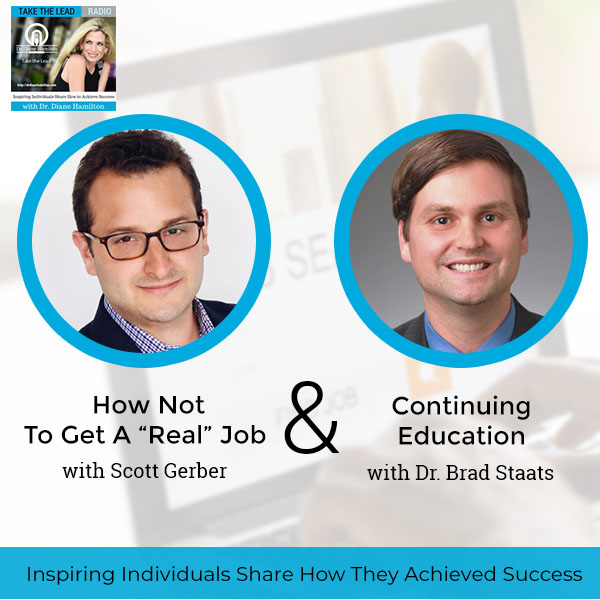

0 Comments